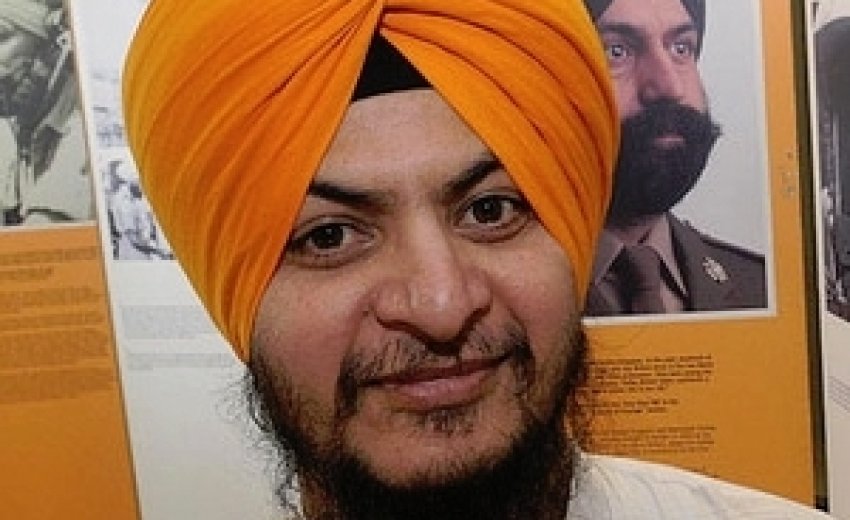Volunteer worker at Sikh temple who received £50 a week in donations wins right to be paid minimum wage
A volunteer worker at a Sikh temple may be entitled to be paid the minimum wage, a court ruled yesterday.
The decision means religious organisations, charities and groups which depend on voluntary help are at risk of having to pay a salary to thousands of people they believed were giving their help free.
It also marked a further erosion of the autonomy of religious believers.
 |
| Case: Tejinder Singh, who served as the granthi, or priest, at Bristol Sikh Temple claims he should have been paid minimum wage even though he had agreed to act as a volunteer |
The ruling on the helper at Bristol’s Sikh temple follows in the wake of key court decisions which downgraded the rights of Christian believers.
One said local councillors have no right to say Christian prayers as part of the public agenda of their meetings, and another quashed the appeal of a couple of Christian hoteliers who wanted the right to reserve double rooms for married couples.
The case involved Tejinder Singh, who served as the granthi, or priest, at the temple for seven years until 2009.
Mr Singh claimed at a tribunal last year that even though he had agreed to act as a volunteer, he should have been paid the minimum wage, which is currently set at £6.08 an hour.
He had accepted free accommodation from the temple for himself and his wife, and the temple gave him £50 a week from the donations of worshippers for performing prayers and blessings.
Some worshippers would also pay him for his prayers on special occasions, like weddings, at rates suggested by the temple management.
He paid no tax or national insurance, and the temple managers said that to treat him as a paid worker would conflict with principles of ‘voluntarism and a traditional interpretation and application of the Sikh scriptures.’
The tribunal last spring said that Mr Singh did not qualify as a worker.
But at the Employment Appeal Tribunal Mr Justice Beatson said it had been wrong, and threw the case open by sending it back to the same tribunal to be reconsidered.
The judge said: ‘The threshold for a finding that the relationship between a religious institution and its officers is not intended to have legal effect is a high one.
‘Arrangements between a church and its ministers should not lightly be taken as intended to have no legal effect.
There is no longer a presumption of no intention to create legal relations between a minister of religion and his or her church or congregation.’
The temple had agreed to accept Mr Singh as a volunteer on the grounds that he was to work without pay and not for gain.
His accommodation, it said, was provided to help him carry out his duties, and the £50 was paid out of respect for his position as an office-holder, and not as pay for his work.
It said that he regularly went on holiday to India, and was not paid while he was away.
But Mr Justice Beaton said the tribunal had made an error and Mr Singh should not have been considered among the temple office-holders who were required to work without pay.
------------------------
Related story:
Sikh priest wins legal victory in wage claim dispute Bristol Evening PostSource:
A SIKH priest paid £50-a-week through voluntary donations by the faithful has won a victory in his fight to prove he was a worker entitled to the national minimum wage.
Tejinder Singh, who served as Granthi, or priest, at Bristol's Sikh Gurdwara in Eastville for seven years until 2009, faces claims from the temple's elders that it flies in the face of Sikh scripture for him to be treated as a worker or employee under minimum wage legislation.

But a top judge has now ruled he can renew his case against the temple's managers before an employment tribunal after pointing out that he had to be available to worshippers for a fixed number of hours every day and was given free accommodation.
The temple's management committee argued that the £50 Mr Singh was given weekly from donations, as well as extra cash from worshippers for performing prayers and blessings, were purely voluntary in nature and did not make him a worker.
No tax or national insurance were deducted from the donations and the temple's management insisted that, to treat him as a worker, would conflict with religious principles of "voluntarism and a traditional interpretation and application of the Sikh scriptures".
As a religious office bearer, the management committee argued Mr Singh had agreed to give voluntary service and to "work without remuneration or any other personal gain".
But, ruling in Mr Singh's favour, Mr Justice Beatson said yesterday that, a Bristol employment tribunal that dismissed Mr Singh's claim last year had "fallen into error" when it decided that he did not fit the definition of a worker under the National Minimum Wage Act 1998.
"Arrangements between a church and its ministers should not lightly be taken as intended to have no legal effect," he told the Employment Appeal Tribunal.
The judge ordered a full re-hearing of his case by the same tribunal on a date to be set.
